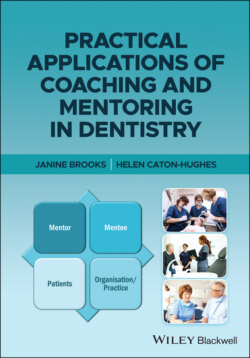Читать книгу Practical Applications of Coaching and Mentoring in Dentistry - Janine Brooks - Страница 31
Personality
ОглавлениеAvoid impossible matches, i.e. those which clearly would not work, for example working with your partner (either business or spouse). Avoid matching very similar people as it can be beneficial to match personality opposites. Opposites can get on very well and the ensuing dialogue is likely to be more stimulating and certainly more challenging! Some of the key skills of mentoring and coaching are receptive listening, adopting a non‐judgemental attitude and supporting the mentee by challenging their current thinking. These are not the domain of specific personality types, neither ‘strong’ or ‘introvert’ personality types; rather they are learned skills, honed by practise. What this means is that, as long as the mentor is well‐trained and suitably experienced, you don’t need to worry about matching ‘strong’ personalities to ensure that they get ‘enough challenge’. So‐called ‘quiet’ people can be challenging too! It's also unwise to assume that ‘strong’ personalities don’t need a sensitive approach or an empathetic listening ear.
The goal is to match people such that the mentee can express their hopes and fears to a receptive, non‐judgmental person who will give them the appropriate amount of guidance and enhance their self‐awareness, such that they take the right decisions for themselves, their professional development and their career direction.
